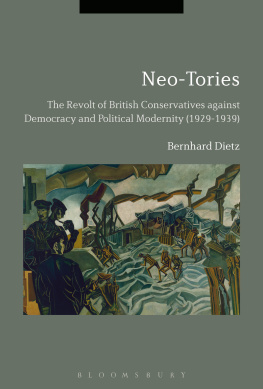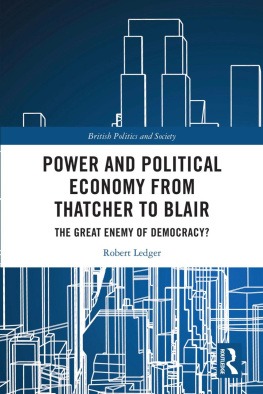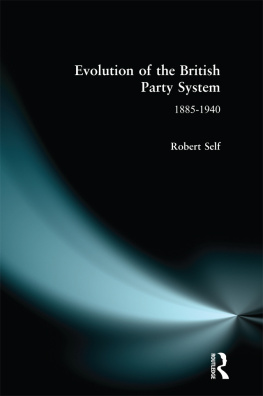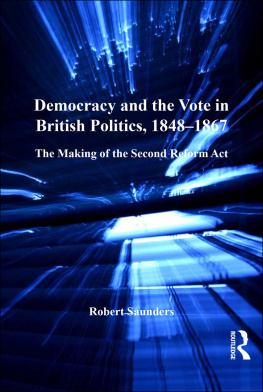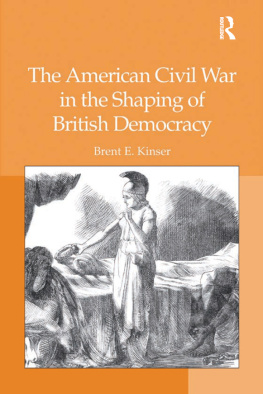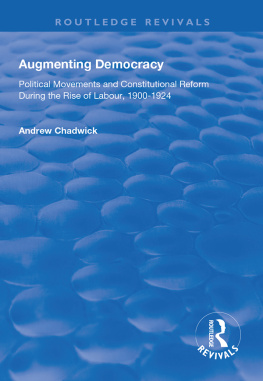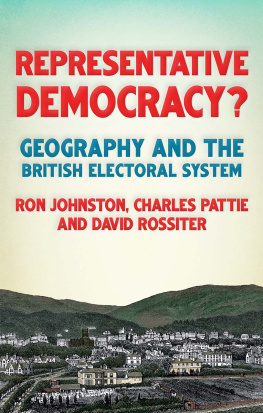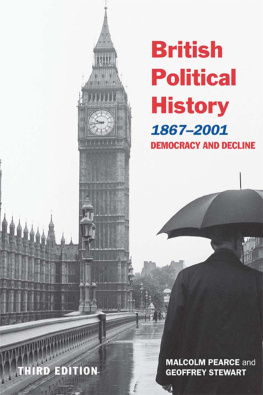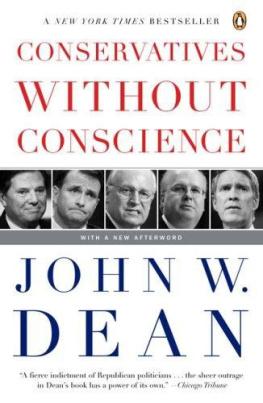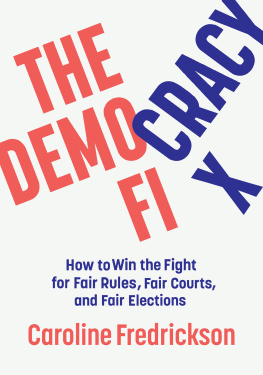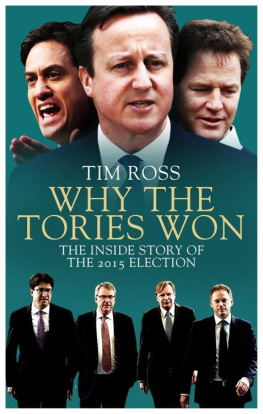
Neo-Tories

Contents
This book is a translation of Neo-Tories: Britische Konservative im Aufstand gegen Demokratie und politische Moderne (19291939), which was published in 2012 by De Gruyter Oldenbourg. The English edition has been slightly changed and revised to make it more accessible for English-speaking readers; the main content remains the same as in the original version. The translation has been made possible by Mainz University and its Gutenberg translation prize, which I won in 2016. I would like to thank the Gutenberg Council for Young Researchers (GYR) for all their help and support with this translation project.
Ian Copestake did a fantastic job in translating the book and I am very grateful for his precision, sensitivity and patience I know it isnt always easy to make sense of German academic jargon. I am very happy that the book is now available to a wider English-speaking public, and for this I would like to thank my German publisher De Gruyter Oldenbourg, especially Rabea Rittgerodt, and the editors of Bloomsbury, in particular Beatriz Lopez.
This English edition is a welcome opportunity to thank again all those scholars, colleagues and friends who helped with their support, advice and critique in the publication of Neo-Tories five years ago. They include my PhD supervisors Heinrich August Winkler and Andreas Gestrich as well as Andreas Rdder, Markus Mlang, Christian Gschel, Anna von der Goltz, Dan Stone, Eric Jacobson, Tilo Wagner and Sebastian Ullrich.
I would also like to thank my parents and sisters for their support and love. In particular, I want to thank my British parents-in-law, Timothy and Tinker Carter, who over the years have persistently reminded me that though they do not understand German, they do have a great interest in what their son-in-law has to say about British conservatism of the interwar period. Finally, I would like to thank my wife Christie, who has been yet again my biggest supporter, and our two children, Arthur and Lilo, for being the best possible distraction from academic life.
| BL | British Library Manuscript Collections, London |
| BLO | Bodleian Library, Oxford |
| BUF | British Union of Fascists |
| CINEF | Centre International dtudes sur la Fascisme |
| ESA | Eugenics Society Archive, London |
| HoCD | House of Commons Debates |
| JMB | Papers of John Moore-Brabazon, Royal Air Force Museum, London |
| LHC | Liddell Hart Centre for Military Archives, Kings College London |
| LJP | Luttman-Johnson Papers, Imperial War Museum, London |
| LLD | Papers of Lord Lloyd of Dolobran, Churchill Archives Centre, Cambridge |
| MP | Member of Parliament |
| NSDAP | Nationalsozialistische Deutsche Arbeiterpartei (National Socialist German Workers Party) |
| TNA | The National Archives, London |
| WL | Wellcome Library, London |
| WP | Wallop Papers (Gerard Vernon Wallop, 9th Earl of Southampton), Hampshire Record Office, Winchester |
| YBP | Yeats-Brown Papers, Harry Ransom Humanities Research Center, The University of Austin, Texas |
| YMCA | Young Mens Christian Association |
The Neo-Tories were a part of British conservativism that organized themselves in the 1930s on the right wing of the Conservative Party in political clubs and alliances, and around several newspapers and magazines. They defined themselves both as an intellectual counterweight to the hated left intelligentsia and as a movement for fundamental renewal within British conservatism. In the context of the times, this group felt that there was no longer anything of the past to conserve and protect. To be conservative was, instead, to fight against a perceived wrong turn in history taken by following ideals of liberal democracy and as such they considered themselves to be revolutionary. While the Neo-Tories were no fascists, certainly there was some common ground with the largest British fascist party the British Union of Fascists under its leader Oswald Mosley and occasional thoughts of cooperation, but the Neo-Tories did not share the fascist view of politics as public spectacle, complete with uniforms, flags and parades, nor did they accept un-English methods such as political violence, antisemitic rabble-rousing and the cult of the leader.
As used here, Neo-Toryism refers to British Neo-Tories during the interwar period who were, for the most part, young politicians or intellectuals who concerned themselves with a radically new direction for British conservatism.Petrie, journalists who turned their efforts in the 1930s to a rebirth of English conservatism, a true Toryism. The key point in their criticism of the Conservative Party was historical: in their opinion the party had been wantonly corrupted by liberalism and therefore shared the responsibility for Englands perceived degeneration, caused by industrial capitalism and liberal democracy. To find a definition of what conservative meant, of what it meant to be a conservative, the Neo-Tories consciously turned to the time of the English Civil War and the Revolution of 16889. When the prefix Neo- is used in the course of this work, it will be to give utterance to the elementary need felt by these men to create a pure, non-liberal Toryism. Neo thus refers in this sense both to the ambition of an all-embracing spiritual and moral renewal and to the attempts by a new generation to distance themselves from older party dissidents.
Petrie appeared here as fellow travellers of the right, more or less strong sympathizers with Italian Fascism or German National Socialism, and as more or less strong supporters of Oswald Mosleys BUF. The Neo-Tories are above all portrayed as recipients, as intellectual observers, courted by the BUF in order to lend them social credibility. An interpretation like this, however, misses out three important points. The political concepts of the Neo-Tories were, first, far from simply an affirmative reaction to fascism and National Socialism, but rather very deliberately developed out of English history and as such comprehensible only as a genuine English world view. Second, the Neo-Tories saw themselves as British, or rather as English conservatives. They had no desire to take on a foreign system, despite their interest in Italian Fascism in particular. Third, the Neo-Tories were very far from being scattered individuals, too individual in outlook to find a home in the BUF. Instead, this was an extremely well-connected group planted firmly within the British social elite.
The historiographical curiosity that leads one to
The concentration of research on the BUF and its leader, Oswald Mosley, may conceal the danger of a historical tunnel vision: namely, the fact that Mosley failed does not prove the non-existence of proto-fascist and right-wing tendencies outside the narrow confines of a fascist party. In fact, the argument that fascism is incompatible with British politics as an alien, imported concept loses conviction when one leaves the arena of historical events and analyses the right-wing intellectual discourse outside the BUF with an intellectual-historical approach. It then becomes clear that British, or specifically English, traditions and ideas can be used to underpin this discourse. The British historian Dan It is, however, questionable how helpful it is to further develop this conception of fascism.
Next page
